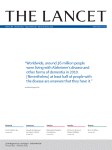International charter on the prevention of fetal alcohol spectrum disorder
Urgent action is needed to prevent more children from acquiring disorders due to mother’s alcohol consumption during pregnancy. This is the appeal from the first international conference on prevention of foetal alcohol spectrum disorders, held in Edmonton, AB, Canada, on Sept 23—25, 2013.
The conference in Edmonton concluded with the adoption of an international charter on the prevention of foetal alcohol spectrum disorder (FASD). Participants were more than 700 people from 35 countries worldwide, including senior government officials, scholars and policymakers, clinicians and other front-line service providers, parents, families, and indigenous people. The charter is published in The Lancet and presented to all concerned in the international community as a call for urgent action to prevent foetal alcohol spectrum disorder.
The charter can be downloaded in pdf version here.
The new FASD charter calls on governments to take action to raise awareness of foetal alcohol spectrum disorder and the risks of alcohol use during pregnancy. Governments must promote a consistent, evidence-based message about prevention by supporting the development and circulation of public health information that is clear and consistent: to abstain from alcohol use during pregnancy is the only certain way to prevent foetal alcohol spectrum disorder.
A preventable disorder
“More than a million babies are born every year with permanent brain injury from a known and preventable cause”, says the FASD charter. “The response should be immediate, determined, sustainable, and effective”.
Other key statements from the international FASD charter include:
- Fetal alcohol spectrum disorder is a serious health and social problem, as well as an educational and legal issue, which affects individuals, families, and societies worldwide.
- Although public knowledge of fetal alcohol spectrum disorder is high in some countries, it is very low worldwide.
- No known amount of alcohol is safe for a growing embryo and fetus, which can develop extensive brain damage and physical abnormalities from exposure to alcohol.
- Findings from basic research have shown clearly that even low to moderate consumption of alcohol can cross the placenta and interfere with the normal development of the embryo and fetus. Heavy or frequent alcohol use increases the risk of giving birth to a baby with fetal alcohol spectrum disorder
- Fetal alcohol spectrum disorder is a lifelong disorder.
- Fetal alcohol spectrum disorder is preventable. However, one major obstacle to prevention is lack of awareness of the disorder's existence and of risks associated with women drinking alcohol during pregnancy.
The charter discusses determinants behind drinking during pregnancy and places a responsibility not only on mothers, bus just as much on men and society at large: “Reasons include women having little information about the risks of drinking while pregnant, drinking before pregnancy is recognised, dependence on alcohol, untreated mental health disorders, and social pressures to drink.
Men are also responsible
The perception that fetal alcohol spectrum disorder is affected only by a woman's choices is a major barrier to effective prevention efforts. Men also have a responsibility. Women's drinking behaviour, and therefore fetal alcohol spectrum disorder, occurs within, and is affected by, a broad familial, cultural, and social context. Partners who show little to no support during pregnancy and who might also misuse alcohol, become violent, and demand that their pregnant partner drink with them, share responsibility for the outcome”.
The International Journal of Alcohol and Drug Research had a special issue in 2013 covering various aspects of FASD. You can access the articles here.
RELATED ARTICLES
- New report highlights benefits of policy measures to prevent harmful alcohol consumption
- Highlighting the COVID-19 – alcohol connection
- Alcohol among risk factors increasing
- WHO Launches Global status report on alcohol and health 2018
- Effective alcohol policies are needed now to yield health benefits in the future
- Intervention gives reduced drinking, aggression and violence
- Alcohol as an obstacle to development
- Empowerment of children is key in drug prevention
- Powerful reminders of the many real effects of alcohol consumption
- Alcohol use a significant cancer risk factor

